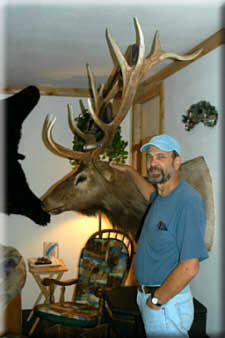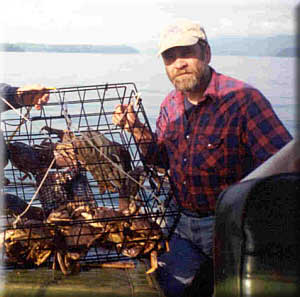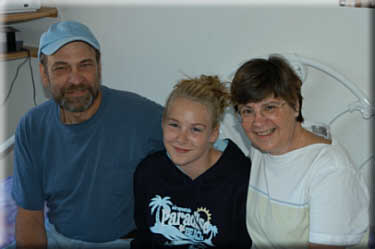Retirement Halted by Malignant Mesothelioma
Vernon "Vern" Braaten grew up on a farm in North Dakota. He and each of his brothers and sisters worked and contributed from an early age. They ate the vegetables they grew, and sometimes the meat from animals raised on the farm. Sometimes whether or not there was meat on the dinner table depended on the success of a hunt.
A necessity turned into a life-long passion for the beauties of hunting and fishing: the fog of his breath billowing in front of him as he stalked a deer in stinging cold; the big, cloudless blue Dakota sky reflected in a still fishing pond; the hush of solitude, space from the crowd of his brothers and sisters; bringing home the kill, providing for his family, a trait which stuck.
Hunger and trying to avoid it was just a day-to-day reality. So was risk, and death. Several of Vern's brothers died in farm accidents.
When a piece of farm equipment or a car broke down, when a building needed to be built or repaired, there was no money to hire someone else to do the job. Vern learned to figure things out for himself. In time he became his own mechanic, lumberjack, miller, carpenter, roofer, and drywaller.
Vern left the long, harsh Dakota winters behind at the age of 17. Then his uncle told him of opportunity for good-paying work as a pipefitter at Puget Sound Naval Shipyard (PSNS) in Bremerton, Washington. Vern began working at PSNS in 1967. He kept working there until his retirement 35 years later, in June, 2002. Over the years he suffered massive exposures to asbestos
Vern's life was full in retirement. Vern has two daughters, Tina and Teresa, and four grandchildren. He lives with his companion Christine "Chris" Musser and his 13 year-old granddaughter Katrina in a townhome owned by Chris. He has helped care for his granddaughter Katrina since her birth, more a father to her, but still with a grandfather's gentle touch.

Vern was building a 7,000 square-foot shop with an apartment in Seabeck. His property is on the side of a hill with a view of the mountains rising to the sky in the west. (He explains the Pacific is on the other side, but "you can't get there from here.") He cut huge cedar trees off his property, planed the lumber, and made the cedar siding for the house. The woodshop occupies half of the second level. A friend named Mike keeps some of his own tools in the shop and comes by to work and hang out with Vern. On the walls in the already finished living room are a black bearskin and one of the biggest elk heads I have ever seen. (He turned down a $5,000 offer for the head from a Fish and Game warden). The garage and auto shop occupying the entire first level of the house have more than adequate height to accommodate a long motor boat "dry-docked" for cleaning. In another part of the garage there's an old El Camino to be refurbished, and a Harley which only needs the tarp pulled off for riding.
Outside, Vern keeps a gentle horse named Rainier, who has his own barn. Next to the barn is the mill Vern made for sawing and planing his lumber. There's a smoke shack for curing meat and fish. He shows me a salt water inlet where he likes to fish and crab.
Vern had come a long way from his impoverished beginnings in North Dakota. His talents and skills enabled him to attain more on a pipefitter's salary than a lot of college-educated men. And Vern was in excellent health. He had never smoked tobacco in his life; in fact, he abhors tobacco smoke. The line of his life was shooting straight up, seemingly forever, until the legacy of the work from which he had retired brought everything to a shocking halt.
In early June, 2003, only a year after he retired from PSNS, Vern began experiencing left-sided pain and shortness of breath. He did not suspect any connection between his shipyard employment and these symptoms. On July 1, 2003, he underwent a left thoracentesis with pleural biopsy at Harrison Memorial Hospital in Bremerton, Washington.

The tissue specimens were examined by the renowned pathologist Dr. Sam Hammar, of Diagnostic Specialties Laboratories in Bremerton, Washington. A member of the U.S.-Canadian Mesothelioma Board, Dr. Hammar is widely recognized as one of the best in the world at diagnosing mesothelioma and otherwise confirming physical evidence of asbestos exposure. (It is more than coincidence that Dr. Hammar offices in Bremerton; because of Washington's numerous shipyards, that state has the highest per capita rate of mesothelioma in the country).
Using immunohistochemical staining, Dr. Hammar diagnosed Vern with epithelial mesothelioma. In a pathology report dated July 7, Dr. Hammar noted grade 1 asbestosis in pieces of the lung tissue with focal involvement of the visceral pleura. These findings corroborate Vern's heavy exposure to asbestos. Dr. Hammar also found extensive fibrosis and chronic inflammation associated with the tumor.
Vern consulted with Dr. Eric Vallieres of the University of Washington in Seattle. Dr. Vallieres is one of the foremost surgeons in the world treating mesothelioma and a member of the Science Advisory Board of the Mesothelioma Applied Research Foundation (MARF ), a not-for-profit corporation whose mission is the eradication of mesothelioma as a life-ending disease.
After reviewing Vern's medical records, Dr. Vallieres felt that he was a qualified candidate for induction chemotherapy followed by an extrapleural pneumonectomy (EPP) and adjuvant fast neutron radiation therapy. Before undergoing the EPP, he would first complete three months of chemotherapy with Alimta, the current chemotherapy "gold standard" for mesothelioma. After the surgery, he would undergo radiation therapy.

Vern's preparation for chemotherapy began on July 21with B12 and folic acid shots. His oncologist in Bremerton is Dr. Dennis Williford of Bremerton, who oversees the administration of Vern's chemotherapy and works directly with Dr. Vallieres. The chemo, administered once every three weeks, leaves Vern extremely weak and nauseous for days.
Currently, Vern apprehends the pain associated with the EPP to come. In fact, he harbors some uncertainty as to whether he will undergo the EPP; he has still not recovered from the pain of the biopsy procedure, and the pain associated with EPP is almost always much worse. He fears the possibility of relentless pain in the future. Three times he flew halfway across the country to be with his father, a farmer, as his father lay dying of stomach cancer, so he has an idea of what may come.
Vern tries not to show these things to Katrina or Chris. He still is a hunter, and a provider -- not a victim. Although family and friends can tell that mesothelioma has aged him, an unknowing outsider would not guess he has cancer, only that he moves slowly, deliberately. Vern has a large circle of friends, and one of the things that has bothered him the most about his disease is that some of his friends have stopped calling or coming by, simply because they do not know what to say to him, or what to expect when they see him. To these people I say, call and come see your old friend; with Dr. Vallieres and a little help from the rest of his friends, he has a chance to be with us a lot longer than the cold statistics predict.
*** POSTED SEPTEMBER 26, 2003 ***
Mr. Vern Braaten passed away on 23,2007
The following is the obituary for Vern Braaten:
Vernon Allen Braaten of Seabeck died at home on Oct. 23, 2007 after a courageous 4 year battle with Mesothelioma (asbestos cancer) at the age of 60. He was born May 18, 1947 in Upham, ND to Ann (Rice) and Calmer Braaten, the second youngest of 12 children.
Vern worked at PSNS for 35 years, retiring in 2002 after working as a pipe fitter in shop 56NT . Vern owned his own company Braaten's Bulldozing company for many years. He believed in hard work, and was an inspiration and teacher to many.
He had a great love and respect of the great outdoors. Hunting, fishing, crabbing, shrimping and being out in Mother Nature was his greatest love. He owned his own sawmill, and processed his own lumber for the building of his "shop." He loved to build and built several houses with expertise. He was a jack of all trades, and a master of all with no doubt. He was a lifetime member of the NRA. Vern was proud to be an American and believed in the Republican Party. Vern was a humanitarian, and a friend to all, and was known for his kind and generous heart and soul. He is going to be deeply missed by many friends and family.
He is survived by his loving life partner (and caregiver) Christine Musser, daughters Tina (Gary) Haymaker and Teresa (Stacy) Dick. Grandchildren Keil Dick, Cassondra Dick, Katrina Haymaker and Robert Haymaker. His sisters Viola Latendresse of Upham ND, Mary of Minot ND, Ruth Latendresse of Minot, ND, and sister Ella of Kelso WA. Brothers Leo Braaten of Great Falls, MT, Floyd Braaten of Minot ND, nephew Allen Brandt of Great Falls MT. and many nieces and nephews. He is also survived by Chris's sons Timothy (Jennifer Shaw) and Anthony (Sandra) Lang, and their children Ariel, Hunter and Talen Lang. He was preceded in death by his parents, and brothers Melvin, Eugene, Robert, Donald, and sister Lola Brandt.
Special thanks go to Nurse Katrina from Hospice of Kitsap County and Dr. Willerford and staff for their loving care and support during his battle with his disease. Also thanks to Mike Manavie for his loving care and help during the long waiting days at the end of Vern's fight.
Vern was of Lutheran faith. At his request there will be no funeral services, but a Celebration of Life will be announced at a later date. In lieu of flowers, a remembrance may be made to the Mesothelioma Applied Research Foundation (M.A.R.F.) at P.O. Box 91840, Santa Barbara, California 93190-1840 in Vern's name. Rest in peace Vern, you were and always will be loved.


